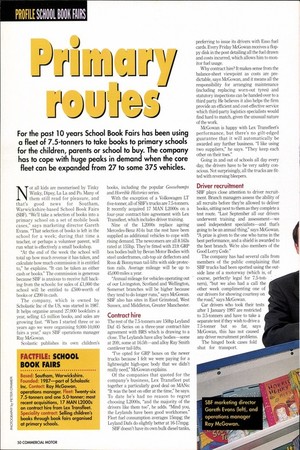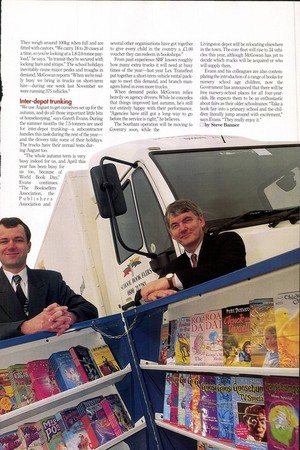For the past 10 years School Book Fairs has been
Page 62

Page 63

If you've noticed an error in this article please click here to report it so we can fix it.
using a fleet of 7.5-tonners to take books to primary schools for the children, parents or school to buy. The company has to cope with huge peaks in demand when the core fleet can be expanded from 27 to some 375 vehicles.
Not all kids are mesmerised by Tinky Winky, Dipsy, La La and Po. Many of them still read for pleasure, and that's good news for Southam, Warwickshire-based School Book Fairs (SBF). "We'll take a selection of books into a primary school on a set of mobile book cases," says marketing director Gareth Evans. "That selection of books is left in the school for a week; during that time a teacher, or perhaps a volunteer parent, will run what is effectively a small bookshop.
"At the end of the week the school will total up how much revenue it has taken, and calculate how much commission it is entitled to," he explains. "It can be taken as either cash or books." The commission is generous because SBF is anxious to receive full backing from the schools: for sales of £1,000 the school will be entitled to £500-worth of books or £200 in cash.
The company, which is owned by Scholastic Inc of the US, was started in 1987. It helps organise around 27,000 bookfairs a year, selling 4.5 million books, and sales are growing fast. "When I started three or so years ago we were organising 9,000-10,000 fairs a year," says SBF operations manager Ray McGowan.
Scolastic publishes its own children's books, including the popular Goosebumps and Horrible Histories series.
With the exception of a Volkswagen LT five-tonner, all of SBF's trucks are 7.5-tonners. It recently acquired 17 MAN L2000s on a four-year contract-hire agreement with Lex Transfleet, which includes driver training.
Nine of the L2000s replace ageing Mercedes-Benz 814s but the rest have been supplied as additional vehicles to cope with rising demand. The newcomers are all 8.163s rated at 155hp. They're fitted with 21ft GRP box bodies built by Bevan Motor Bodies with steel underframes, cab-top air deflectors and Ross & Bonnyman tail-lifts with side protection rails. Average mileage will be up to 45,000 miles a year.
"Annual mileage for vehicles operating out of our Livingston, Scotland and Wellington, Somerset branches will be higher because they tend to do longer runs," says McGowan. SBF also has sites in East Grinstead, West Sussex, and Middleton, Greater Manchester.
Contract hire The rest of the 7.5-tonners are 150hp Leyland Daf 45 Series on a three-year contract-hire agreement with BRS which is drawing to a close. The Leylands have alloy bodies—some at 20ft, some at 16.5ft—and alloy Ray Smith cantilever tail-lifts.
"I've opted for GRP boxes on the newer trucks because I felt we were paying for a lightweight high-spec body that we didn't really need," McGowan explains.
Of the companies that quoted for the company's business, Lex Transfleet put together a particularly good deal on MANs: "It was the best on offer at the time," he says. To date he's had no reason to regret choosing L2000s, "and the majority of the drivers like them too", he adds. "Mind you, the Leylands have been good workhorses." Fleet fuel consumption averages 15mpg; the Leyland Dafs do slightly better at 16-17mpg.
SBF doesn't have its own bulk diesel tanks, preferring to issue its drivers with Esso fuel cards. Every Friday McGowan receives a floppy disk in the post detailing all the fuel drawn and costs incurred, which allows him to monitor fuel usage.
Why contract hire? It makes sense from the balance-sheet viewpoint as costs are predictable, says McGowan, and it means all the responsibility for arranging maintenance (including replacing worn-out tyres) and statutory inspections can be handed over to a third party. He believes it also helps the firm provide an efficient and cost-effective service which third-party logistics specialists would find hard to match, given the unusual nature of the work.
McGowan is happy with Lex Transfleet's performance, but there's no gilt-edged guarantee that it will automatically be awarded any further business. "I like using two suppliers," he says. "They keep each other on their toes."
Going in and out of schools all day every day, the drivers have to be very safety conscious. Not surprisingly, all the trucks are fitted with reversing bleepers.
Driver recruitment SBF plays close attention to driver recruitment. Branch managers assess the ability of all recruits before they're allowed to deliver books, sitting next to them as they complete a test route. "Last September all our drivers underwent training and assessment—we used independent specialists—and that's going to be an annual thing," says McGowan. "A prize is given to the one who turns in the best performance, and a shield is awarded to the best branch. We're also members of the Good Lorry Code."
The company has had several calls from members of the public complaining that SBF trucks had been spotted using the outside lane of a motorway (which is, of course, perfectly legal for 7.5-tonners), "but we also had a call the other week complimenting one of our drivers for showing courtesy on the road," says McGowan.
Car drivers who took their tests after 1 January 1997 are restricted to 3.5-tonners and have to take a separate test if they wish to drive a 7.5-tonner but so far, says McGowan, this has not caused any driver recruitment problems.
The hinged book cases fold shut for transport. They weigh around 100kg when full and are fitted with castors. "We carry 18 to 20 cases at a time, so you're looking at a 1.8-2.0-tonne payload," he says. "In transit they're secured with locking bars and straps." The school holidays inevitably cause major peaks and troughs in demand, McGowan reports "When we're really busy we bring in trucks on short-term hire—during one week last November we were running 375 vehicles."
Inter-depot trunking "We use August to get ourselves set up for the autumn, and do all those important little bits of housekeeping," says Gareth Evans. During the summer months the 7.5-tonners are used for inter-depot trunking—a subcontractor handles this task during the rest of the year— and the drivers take some of their holidays. The trucks have their annual tests during August too.
"The whole autumn term is very busy indeed for us, and April this year has been busy for us too, because of World Book Day," Evans continues. "The Booksellers Association, the Publishers Association and several other organisations have got together to give every child in the country a .£1.00 voucher they can redeem in bookshops."
From past experience SBF knows roughly how many extra trucks it will need at busy times of the year—last year Lex Transfleet put together a short-term vehicle rental package to meet this demand, and branch managers hired in even more trucks.
When demand peaks McGowan relies heavily on agency drivers. While he concedes that things improved last autumn, he's still not entirely happy with their performance. "Agencies have still got a long way to go before the service is right," he believes.
The Southam operation will be moving to Coventry soon, while the = Livingston depot will be relocating elsewhere in the town. The core fleet will rise to 34 vehicles this year, although McGowan has yet to decide which trucks will be acquired or who will supply them.
Evans and his colleagues are also contemplating the introduction of a range of books for nursery school age children, now the Government has announced that there will be free nursery-school places for all four-yearolds. He expects them to be as enthusiastic about fairs as their older schoolmates: "Take a book fair into a primary school and the children literally jump around with excitement," says Evans. "They really enjoy it" by Steve Banner




































































































































